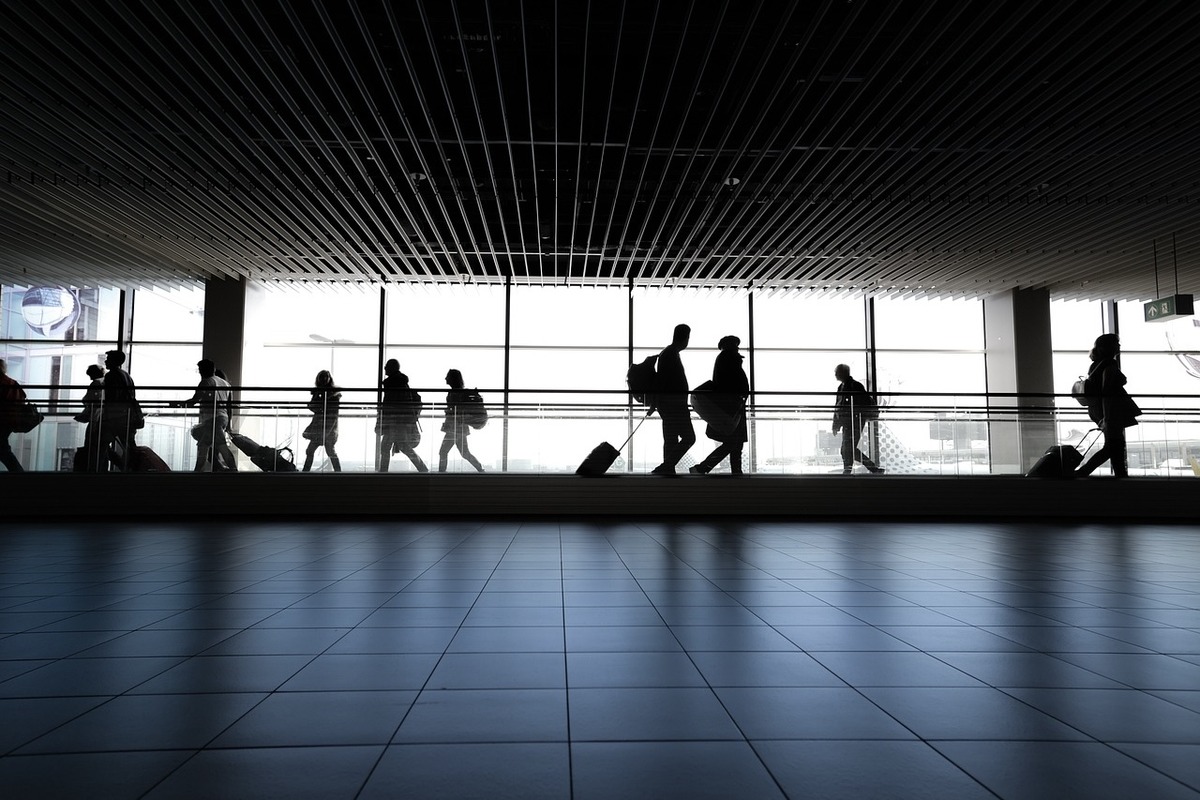What's Going on With the Economy? And How Will it Impact the Travel Sector?

Skift Take
After 15 years without a recession (ex-Covid), Friday’s jobs report has sent U.S. markets into a freefall and has a lot of people whispering the R-word. Here’s what’s going on and what it means for the travel industry.
So What Happened?! Everything Was Going So Well
A trifecta of bad economic news has roiled American markets, which are in the middle of a sell-off after a huge run earlier this summer. Here’s why:
- On Friday, the Bureau of Labor Statistics put out its monthly report that showed the U.S. economy added only 114,000 jobs in July, a much lower number than expected. The unemployment rate ticked up to 4.3%.
- That, coupled with the fear that the Federal Reserve has been too slow to cut interest rates has caused significant market volatility.
- And earnings season, which we are still in the middle of, has been full of so-so to poor results.
And Today the Market Is?
A bloodbath. The S&P 500 is down roughly 8% from the peak hit just last month. The Nasdaq, more exposed to tech stocks, is down more than 12%.
Our own Skift Travel 200 index hit a high in March and came close to that high again in mid-July. It’s down more than 13% since March.
The selloff in the travel stocks began to accelerate at the end of last week, with a 4% drop for the ST 200 on Friday. This was the biggest decline in the ST 200 index since June 2022. Booking Holdings was down more than 9% and Expedia Group and Airbnb both fell nearly 5%. Hotel groups were relatively less affected, with Hilton and Marriott down only around 2%. European hotel group Accor was down nearly 5%, after losing more than 15% last month.
Why Do People Think This Might Cause a Recession?
Claudia Sahm, Chief Economist at New Century Advisors, said her “Sahm Rule,” an early warning sign of recessions, has been triggered by the increase in the unemployment rate.
“We’re not in a recession. We are in a place where things have slowed,” Sahm said on CNBC Friday. “So we’re not in contraction territory. What is very worrisome - and today’s employment report underscored - is the direction of travel, the momentum is not good. We are pointing towards what would be recessionary dynamics.”
What Does This Mean for the Travel Industry?
Since the pandemic, the travel industry has been on an absolute tear, breaking record after record. But now we’re seeing signs of a pull back in some areas. Here’s a sector by sector look:
Airlines. Since 2022, airlines worldwide have enjoyed robust demand. But that was also underpinned by a healthy U.S. economy. Airlines are thus understandably concerned as they digest this flurry of new data.
If there is a recession, and Americans do feel less wealthy, it could benefit low-cost carriers – they tend to do well when budgets are tight. On the opposite end of the spectrum are big airlines like United and Delta, the two U.S. superstars of the industry during the post-pandmeic era. Much of their recent success stems from premium longhaul demand, fueled by travelers willing to spend more freely.
On the earnings front, here’s what they had to say:
- Delta’s Earnings: Delta said results disappointed but not because of a macro slowdown.
“Premium continued to outperform and differentiate our results,” said Delta president Glen Hauenstein. CEO Ed Bastian said on the call that he believed the industry has fundamentally changed: “Value in this industry for many years was defined as having the lowest fare in the market. That’s changed,” Bastian said. “That’s changed dramatically. The experience economy that we’ve seen that’s taken hold, that’s driven the high demand set that we are seeing.” - United Earnings: United reported around a 27% increase in profits for the second quarter, buoyed by demand for international travel, a surge in corporate travel, along with increases in revenues for basic economy and premium tickets.
Hotels. There's bound to be a bit of cognitive dissonance when hearing about travel softening for anyone who has traveled to hotspots like New York, London, Tokyo, or Madrid this summer and felt jostled by hordes of American tourists. But some early signals from hotel earnings suggest signs of a second-half slowdown.
Early signals from Marriott, Wyndham, and hotel REITs point to weakening revenue per available room in recent months. But hotels still had a lot of momentum in the second quarter. Truist Securities analysts analyzed over 1,000 U.S. hotels gross operating profit margins for full-service and luxury hotels and they were very close to 2019's level (just 110 basis points vs. same time 2019). Underlying profitability is one reason why Marriot didn't reduce its guidance for how much EBITDA it expects to report this year.
Three key trends Skift is watching:
- Widening wealth gap. Luxury hotels thrive while economy occupancy slumps. Persistent inflation and stock market gains fuel this divergence. A market correction could dent high-end demand.
- China weakness. Marriott cited surprise softness in its second-largest market, with RevPAR down 4% year-over-year. Economic headwinds curb spending, shrinking booking windows dramatically. Strong outbound travel lifts other Asian markets, but uncertainty lingers.
- Tech sector spending. AI and data center investments totaled $106 billion in H1 2024, boosting hotels in tech hubs like Seattle. A pullback could ripple through the industry.
We'll know more when IHG, Hyatt, Hilton, and Choice report this week. For hotels, TD Cowen views that modest guide downs in fiscal year revenue per available room guidance are possible. Hotel reservations are often refundable, and so the picture can change within a month or two if traveler sentiment shifts.
It's not all bad news. Strong outbound Chinese travel is lifting results in other Asian markets. But uncertainty around the duration of China's slump leaves Marriott cautious.
Lastly, AI spending is another X factor. During earnings, Microsoft, Alphabet, Amazon and Meta revealed huge increases in spending on artificial intelligence, data centers, and related IT spending in the first six months of 2024 — totaling $106 billion this year.
Seattle hotels had the strongest first-half to a year since 2019. If tech companies pull back on their spending in response to equity investors selling shares, will that impact the spending, with a knock-on effect on hotels?
From earnings:
- Marriott: RevPAR to grow between 3% and 4% this year. The top end had been 5%. Executives blamed the adjustment in outlook on greater-than-expected weakness in China. “Ancillary spending was a hair softer than we anticipated,” said Marriott’s CFO Leeny Oberg. “It does show that the consumer, in general, is perhaps being a bit more judicious about the fancy dinner. And that is really the only thing. It’s not trading down in any meaningful way.”
- Wyndham: Revised down its 2024 global revenue per available room growth outlook to “approximately flat” from the previous guidance of 2-3% growth. Of note, the company was able to keep its profit guidance, in part because of recent technology investments. “Our business is getting more efficient, particularly on the technology side,” said Michelle Allen, Wyndham’s CFO.
- MGM. “Through our room rates, Formula One is showing some softness. We are hoping and believing that this rate will continue to pace up. But that presents a potential headwind in the fourth quarter.” “The real issue with Formula One is it’s off to a soft start as compared to last year where we had a lot of advanced pre-bookings. You can see some of our ADRs [average daily rates] are down — if you look at what we’re charging – 50%, give or take,” says CEO William “Bill” Hornbuckle
Online Travel
Booking Holdings. Booking Holdings Chief Financial Officer Ewout Steenbergen said last week the company has seen “a really mild indication of some trade down in the U.S.” in terms of customers selecting hotels with lower star ratings or staying fewer days.
He added: “But otherwise globally we see a very steady picture.” In the third quarter, Steenberger said the company expects ADRs (average daily rates) to be down “slightly” year over year.
At Trivago, the Germany-based hotel metasearch company, Chief Financial Officer Robin Harries said last week, “We believe that the demand remains solid for the second half of the year. We also expect ABVs (average booking values) to be solid. So this looks healthy."
Is Anyone Happy? Yes! Cruises
With all this bad news, it still seems a good time to be a cruise industry exec. They aren’t seeing any indications of bookings and guest spending on trip amenities slowing down in the near future. Executives have said bookings for 2025 remain strong.
“We are seeing absolutely no decrease in onboard spend,” said Mark Kempa, chief financial officer for Norwegian Cruise Line, on an earnings call July 31. “Overall, the short answer is no cracks, no deterioration.”
In fact, executives are only seeing guests spend more on trips despite cruise companies charging more.
“Their willingness to pay more for these incredible vacation experiences continues to increase, so our pricing continues to increase into 2025 and into 2026,” said Royal Caribbean CEO and President Jason Liberty on July 25.
What’s Happening Globally?
It’s better. Amid growing fears of a slowdown in U.S. economic growth, most Asian currencies remained stable on Monday. The Japanese yen was an outlier, appreciating sharply due to expectations of potential interest rate hikes by the Bank of Japan. It reached mid-January highs against the dollar. Japan had so far been going through a tourism bonanza due to a depreciating yen, however, so this jump may have short-term effects on tourism.
In the Middle East, your safe havens are primarily Saudi Arabia and the UAE - super-rich economies delicately built around keeping their expat populations happy with zero income tax, high standards of living, and geopolitical shelter from the surrounding region.
China: The Chinese yuan also leaped to a 7-month high, which is good for the outbound tourism recovery of the country in a scenario where earlier reports have stated that cost of travel has become the primary barrier to selling outbound travel this year.
India. Indian markets faced turbulence, with the benchmark Sensex dropping over 2,400 points. However, some analysts believe Indian markets may stabilize sooner than others, potentially offering recovery opportunities. This would not have any long-term effects on tourism if the recovery happens soon enough as travel booking windows in India are usually shorter.
UAE. Public companies in the UAE have come out of the first half of the year happy, mostly because of development booms across the region. Financial meltdowns, however, hit developers the hardest. The UAE travel economy is largely built around luxury. If we see global economic softening, the UAE’s expensive offerings could suffer as people opt for cheaper destinations – or opt not to travel at all.
North Africa. Sensitive markets like Egypt, Jordan and Lebanon swing massively with economic and political shocks. These markets rely much more on regional source markets and family travel and are more price-sensitive than UAE and Saudi.
Additional reporting by Sean O'Neill, Jay Shabat, Pranavi Agarwal, Dawit Habtemariam, Dennis Schaal, Josh Corder, Peden Doma Bhutia.
Correction: This story has been updated to reflect Wyndham's efficiencies stem from its investments in technology.





